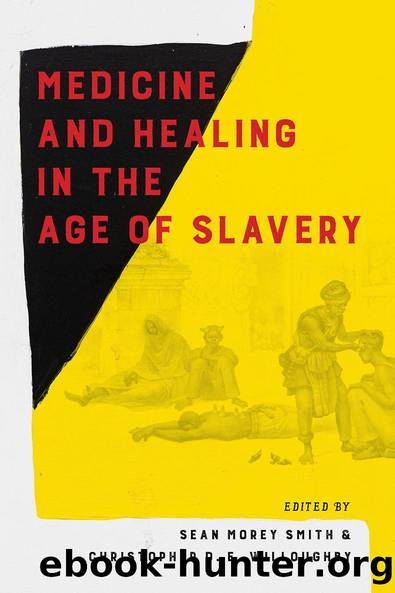Medicine and Healing in the Age of Slavery by Unknown

Author:Unknown
Language: eng
Format: epub
ISBN: 9780807171219
Goodreads: 57801494
Publisher: LSU Press
Published: 2021-11-10T00:00:00+00:00
NOTES
1. âMedical log of the slave-ship âLord Stanleyâ kept by Christopher Bowes,â 1792, MS0003, The Royal College of Surgeons of England (cited hereafter as RCS), London; Trans-Atlantic Slave Trade Database, 2019, accessed March 1, 2021, Voyages: The Trans-Atlantic Slave Trade Database, https://www.slavevoyages.org/voyages/KUWwEbej; Marcus Rediker, The Slave Ship: A Human History (New York: Penguin, 2007), 402â3 n. 26; Sowandeâ Mustakeem, Slavery at Sea: Terror, Sex, and Sickness in the Middle Passage (Urbana: University of Illinois Press, 2016), 130. Under the Slave Trade Act of 1788, slave ship surgeons were guaranteed a premium for maintaining a mortality rate of less than 2 percent. See Richard Sheridan, âThe Guinea Surgeons on the Middle Passage: The Provision of Medical Services in the British Slave Trade,â International Journal of African Historical Studies 14, no. 4 (1981): 610.
2. Sowandeâ Mustakeem, ââShe must go overboard & shall go overboardâ: Diseased Bodies and the Spectacle of Murder at Sea,â Atlantic Studies 8, no. 3 (2011): 310.
3. âMedical log,â 1792, MS0003, RCS, London.
4. On enslaved women and feigning illness: Kenneth Stampp, The Peculiar Institution (1956; New York: Vintage Books, 1989), 103â4; Deborah Gray White, Arânât I a Woman? Female Slaves in the Plantation South (1985; New York: W. W. Norton and Co., 1999), 79â89. I use âfeigned illnessâ instead of âmalingerâ because âmalingerâ was not widely used until 1785. Malingering does not have an equivalent in French or most other western European languages. Before the late eighteenth century, English authors described enslaved people who engaged in âdissembled,â âaffected,â âpretended,â or âfeignedâ illness. French authors usually used the verbs contrafaire (counterfeit), or feindre (pretend or feign), or they emphasized the difference between the ill and the paresseux (lazy). Oxford English Dictionary online, s.v. âmalinger, v.,â accessed October 16, 2018, http://www.oed.com/view/Entry/112944?redirectedFrom=malinger.
5. Alice Bauer and Raymond Bauer, âDay to Day Resistance to Slavery,â Journal of Negro History 27, no. 4 (October 1942): 406â14. For a summary of this scholarship, see Cedrick Robinson, Black Marxism: The Making of the Black Radical Tradition (1983; Chapel Hill: University of North Carolina Press, 2000), 123â25; Walter Johnson, âOn Agency,â Journal of Social History 37, no. 1 (2003): 113â24.
6. James C. Scott, Weapons of the Weak: Everyday Forms of Peasant Resistance (New Haven, CT: Yale University Press, 1985); Stampp, The Peculiar Institution.
7. Stampp, The Peculiar Institution, 280; Angela Davis, âReflections on the Black Womanâs Role in the Community of Slaves,â Black Scholar 3 (December 1971): 2â16; Darlene Clark Hine, âFemale Slave Resistance: The Economics of Sex,â Western Journal of Black Studies 3, no. 2 (1979): 123â27; White, Arânât I a Woman?; Lucille Mathurin Mair, A Historical Study of Women in Jamaica, 1655â1844 (1974; Kingston: University of the West Indies Press, 2006); Arlette Gautier, Les Soeurs de solitude: Femmes et esclavage aux Antilles du xviie au xixe siècle (1985; Rennes: Presses universitaires de Rennes, 2010), 197â229; Barbara Bush, Slave Women in Caribbean Society, 1650â1838 (Bloomington: Indiana University Press, 1990), 61â62; David Barry Gaspar and Darline Clark Hine, eds., More Than Chattel: Black Women and Slavery in the Americas (Bloomington: University of Indiana Press, 1996).
Download
This site does not store any files on its server. We only index and link to content provided by other sites. Please contact the content providers to delete copyright contents if any and email us, we'll remove relevant links or contents immediately.
| Civilization & Culture | Expeditions & Discoveries |
| Jewish | Maritime History & Piracy |
| Religious | Slavery & Emancipation |
| Women in History |
Cecilia; Or, Memoirs of an Heiress — Volume 1 by Fanny Burney(32546)
Cecilia; Or, Memoirs of an Heiress — Volume 2 by Fanny Burney(31943)
Cecilia; Or, Memoirs of an Heiress — Volume 3 by Fanny Burney(31929)
The Secret History by Donna Tartt(19052)
Sapiens: A Brief History of Humankind by Yuval Noah Harari(14368)
Leonardo da Vinci by Walter Isaacson(13316)
The Radium Girls by Kate Moore(12018)
Sapiens by Yuval Noah Harari(5365)
How Democracies Die by Steven Levitsky & Daniel Ziblatt(5215)
The Wind in My Hair by Masih Alinejad(5091)
Homo Deus: A Brief History of Tomorrow by Yuval Noah Harari(4908)
Endurance: Shackleton's Incredible Voyage by Alfred Lansing(4769)
Man's Search for Meaning by Viktor Frankl(4581)
The Silk Roads by Peter Frankopan(4525)
Millionaire: The Philanderer, Gambler, and Duelist Who Invented Modern Finance by Janet Gleeson(4465)
The Rape of Nanking by Iris Chang(4203)
Joan of Arc by Mary Gordon(4100)
The Motorcycle Diaries by Ernesto Che Guevara(4089)
Stalin by Stephen Kotkin(3957)
